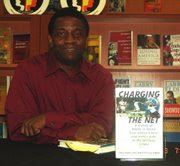
My father was a Baptist minister and rooted for the New York Mets. But even at age 5, I knew he didn’t consider the Mets God’s team.
Not unless he knew that God couldn’t watch baseball without laughing because, at the time, the Mets were the biggest joke in the sport.
Logic actually dictated my father’s choice. Born on the Caribbean island of Barbados, he grew up playing cricket, baseball’s older British-born cousin.
When he immigrated to Brooklyn, he soon learned that to Americans cricket is a critter that keeps a light sleeper up at night or a top hat-wearing crooner in a Disney cartoon.
Dad chose baseball because it was the closest thing to cricket, and he chose Jackie Robinson as his favorite player because the Brooklyn Dodger was the closest thing to an icon on God’s earth.
The black community turned out in force to see Robinson once he shattered the color barrier in Major League Baseball on April 15, 1947.
Dad came to Brooklyn largely because Robinson played there.
Dad taught me how Robinson stared down racism and paved the way for a new generation of black stars in major league baseball, and how Robinson asserted his manhood with every step, every gesture, and every utterance.
Dad’s third-favorite place, after home and church, was Ebbets Field, the home of the Dodgers.
Being a Dodger fan allowed him to sit among crowds infinitely more integrated than the rest of America.
When the Dodgers traded Robinson to the New York Giants after the 1956 season, Robinson retired rather than suit up for the Dodgers’ arch rivals.
"Good for him," was Dad’s reaction.
And when the Dodgers broke Brooklyn’s heart and left for Los Angeles after the 1957 season, and took the Giants to California with them, Dad's reaction was, "Good riddance."
What Dad never said was, "Let’s go Yankees!"
Dad simply abstained from rooting for any major league team from 1957 to 1962, the year National League baseball returned to New York — well, sort of — in the form of the Mets.
Dad treated the Mets as lineal descendants of the Dodgers and Giants, which of course they were not.
The rational side of Dad’s brain knew the Metropolitan Baseball Club of New York was little more than baseball’s naked effort to capitalize financially on fans eager to support a second pro baseball team in the nation’s largest city.
"So why didn’t you just switch to the Yankees?" I asked with youthful naiveté.
Dad glared at me as if I had questioned God’s existence. I’ll never forget him sitting me down and explaining with the patience of Job, "If you were black then and you knew what was going on, you didn’t root for the Yankees.
"The Yankees," he said, virtually expectorating the words, "they didn’t want black players. That American League, especially the Yankees and Boston, they didn’t want black players."
That I would learn was an incontrovertible fact, almost as perplexing to my young mind as the knowledge that some black Africans had participated in the slave trade.
I said almost.
The New York Yankees did not have a black player until Elston Howard in 1955 — eight years after Robinson’s Dodgers debut, seven years after Roy Campanella joined the Dodgers, six years after Monte Irvin suited up for the Giants, and the year after the Giants won the World Series with a young black star named Willie Mays running down everything in center field!
Boston? Pitiful Boston was the last major league team to field an African-American player: Pumpsie Green in 1959.
"The Yankees saw the Giants win the World Series with black stars, and the Giants played at the Polo Grounds in Manhattan," Dad explained.
"And the Dodgers, playing right here in Brooklyn, finally beat the Yankees in the ’55 World Series with black stars — Jackie, Campy [Campanella], Don Newcombe. The Yankees knew by then they had to get with the program and sign some black fellas. But for the longest time, they didn’t want us."
That’s why Dad didn’t like the Yankees.
And my brother Andrew, three years older than I, didn’t like the Yankees either because he was going through that phase in which he wanted to be exactly like Dad in every way.
For whatever reason, I never went through that phase.
Dad was a minister. I grew up to become a journalist and author.
Dad and Andrew rooted passionately for the Mets. I rooted just as passionately for the Yankees — a team that had black players by the time Dad introduced me to baseball.
I sometimes reminisce about the passionate arguments I used to have with my father and brother about baseball:
Which team is better, Yankees or Mets?
Which was the better ballpark to watch a game, Yankee Stadium or Shea Stadium?
I still can’t believe they thought that Flushing dump was somehow superior to the great ballpark in the Bronx.
Dad and Andrew are gone now. So are Shea Stadium and the original Yankee Stadium. How I miss the fun and passion of those arguments.
And how grateful I am to have had a father who instilled in me and nurtured a love of baseball — a truly beautiful game, no matter how much today’s players try to ruin it.


No comments:
Post a Comment